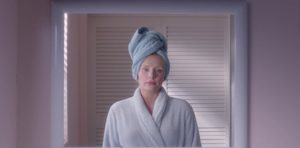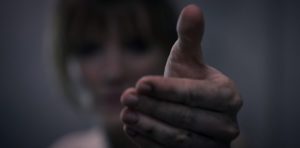Charlie Brooker, Black Mirror’s writer and executive producer, knows how important it is to grab an audience’s attention from the start. We saw this when we first tackled the show in Season 4 with USS Callister. We’ll see it again in Season 2 when we discuss Be Right Back, and we’re sure to be shaken when we finally get around to that famous opening act of Season 1, The National Anthem. But for now, it’s time to boot up Season 3 with Nosedive, written by Brooker, Rashida Jones, and Michael Shur, and directed by Joe Wright (Darkest Hour, Pride and Prejudice).
Nosedive is about a woman named Lacie (played by Bryce Dallas Howard), who is seeking to improve her socioeconomic status. She attempts this through an unnamed app that has taken the world by storm, one that allows people to rank others on a scale of 1-to-5 stars (5 being the highest, of course) based on the interactions they have with them, both online and offline. In a bizarre but not unbelievable twist, this app also virtually highlights faces in real-time via eye implants, showing you a person’s average rating next to their face. In the online realm, Lacie does in her fictional world what we do in our nonfictional one; she takes selfies, pictures of her food and special items, and spends her time interacting and “liking” posts that people have put on their feed. This isn’t unfamiliar to us. Come to think of it, this is everyday life for a significant number of people. But what’s scary is the fact that the app has literally become Lacie’s world around her. Everyone else has willed it into their lives, and as such, it has become a part of Lacie’s foundation. There doesn’t appear to be anyone in Nosedive that isn’t using the ranking system.
At the beginning of the episode, Lacie longs to thrive in the world the app has created. She’s the definition of a brown-noser, flashing the smile she has practiced in front of her mirror while pretending she’s interested in the lives of others, even offering people free food in the hopes that she’ll receive a good daily rating. So far, she has done well, earning herself a 4.2-star average rating. However, in order to move into a new luxury apartment, she needs a 4.5-star rating to get a 20% discount on the rent. Lacie meets up with a social analyst to talk about how to boost her rating quickly so she can put a deposit down on the apartment. He tells her that she needs to seek out folks that have a 4.5 or higher rating and have them positively rank her, as she can’t do so by doing what she has been up until now – getting rankings from service industry workers. Her analyst goes as far to tell her that these people aren’t “quality” people, as their ratings aren’t that high and are therefore “mid-to-low-range folks.”
 In a seemingly providential development, Lacie receives a call from her childhood friend, Naomi (played by Alice Eve). Naomi is calling to ask her if she wants to be her maid of honor at her wedding – a wedding that will be full of people rated 4.5 and above. Even though we learn that Lacie has lost touch with Naomi – and we receive foreshadowing that Naomi may not be the person she’s putting on in front of Lacie – Lacie accepts the maid of honor invite, knowing that she’ll benefit from the boost she’ll be bound to receive after she gives a sappy speech.
In a seemingly providential development, Lacie receives a call from her childhood friend, Naomi (played by Alice Eve). Naomi is calling to ask her if she wants to be her maid of honor at her wedding – a wedding that will be full of people rated 4.5 and above. Even though we learn that Lacie has lost touch with Naomi – and we receive foreshadowing that Naomi may not be the person she’s putting on in front of Lacie – Lacie accepts the maid of honor invite, knowing that she’ll benefit from the boost she’ll be bound to receive after she gives a sappy speech.
If the title of the episode wasn’t clear enough about what audiences are in for, Lacie soon begins her nosedive. The morning she leaves for Naomi’s wedding venue, she gets in a fight with her brother who pleads for the real Lacie to come back and to not move into the fancy apartment, which he bluntly calls “fake-smile jail cells.” He continues,
“I am sorry, but I miss the normal you. Before this obsession, when we had conversations, remember? This whole ranking thing, just comparing yourself to people who only pretend to be happy. High fours like Naomi, I bet they’re suicidal on the inside.”
Lacie’s day continues to go downhill. Because she had the spat with her brother, Lacie rushes out of the house and runs into her neighbor, spilling her drink all over her neighbor’s clothes. Her cab driver is also irritated with her as she was not only late getting out of the house, but because she carried on a very vocal – and annoying – phone call in the ride to the airport. Lacie’s average begins to plummet after receiving low interaction ratings from all of these people, but it’s nothing like what’s waiting for her inside the airport. After being told her flight was cancelled, Lacie lashes out and makes a scene, prompting an employee to call security to get Lacie ushered out. Because of this, security subtracts a full point from her score for a temporary period of 24 hours. During this time, the low ratings Lacie receives are in “double damage” mode, leaving her at risk for a bigger fall if she continues to act out of place.
 Lacie’s terrible, horrible, no good, very bad day marches on, and she eventually attempts hitchhiking after her old rental car runs out of power on the 9-hour drive to Naomi’s wedding. A truck driver named Susan (played by Cherry Jones) pulls up alongside Lacie and asks her if she needs a ride. Even though she desperately needs a ride, Lacie balks at the offer because she sees Susan’s rating: a 1.4. Even though she’s nervous about it, her desperation takes over and she accepts the offer, ignorant of course that her experience with Susan would be truly life-changing. Susan proceeds to have a heartfelt conversation with Lacie about “the system,” and how she used to hold a 4.6 rating, but after her husband got cancer, her life began to take a nosedive as well. Even though she highly rated all the doctors and consultants who worked with them, her husband, who had a 4.3 rating, was passed over for vital treatment to someone who had a 4.4 rating, and died soon after. After he died, Susan lost every care she had for the social rating system. She tells Lacie,
Lacie’s terrible, horrible, no good, very bad day marches on, and she eventually attempts hitchhiking after her old rental car runs out of power on the 9-hour drive to Naomi’s wedding. A truck driver named Susan (played by Cherry Jones) pulls up alongside Lacie and asks her if she needs a ride. Even though she desperately needs a ride, Lacie balks at the offer because she sees Susan’s rating: a 1.4. Even though she’s nervous about it, her desperation takes over and she accepts the offer, ignorant of course that her experience with Susan would be truly life-changing. Susan proceeds to have a heartfelt conversation with Lacie about “the system,” and how she used to hold a 4.6 rating, but after her husband got cancer, her life began to take a nosedive as well. Even though she highly rated all the doctors and consultants who worked with them, her husband, who had a 4.3 rating, was passed over for vital treatment to someone who had a 4.4 rating, and died soon after. After he died, Susan lost every care she had for the social rating system. She tells Lacie,
“I started saying what I wanted, when I wanted. Just drop it out there. People don’t always like that. It is incredible how fast you slip off the ladder when you start doing that. It turned out a lot of my friends didn’t care for honesty. But… [It] felt good… It was like taking off tight shoes.”
After this meaningful encounter, Lacie soon begins to shed her skin, changing back into the real Lacie, the broken, fallen individual that relied on social media to cover up her flaws. As she nears the wedding venue, Naomi tells Lacie to not show up because she saw how low her rating had plummeted over the past 24 hours, and we learn that Naomi had only wanted Lacie to show up because it would have been mutually beneficial for both of their social profiles. More determined than ever, Lacie tells Naomi that she is still going to deliver her speech, and after she finally arrives at the wedding and sneaks onto the grounds, she delivers her speech, which is vastly different from the one she concocted before, yet completely and angrily honest. Lacie’s fake smiles are gone, but she bares her real teeth before being escorted off of the premises.
 The last we see of Lacie is in a jail cell of sorts, stripped of her eye implants. One of the most haunting images of Black Mirror is in this cell, when we see Lacie try to rate a person in another cell across from her. Her hand cradles a phone that isn’t there, her thumb slides on an invisible screen before sending a hallucinated rating. It’s all muscle memory for Lacie, and as the camera focuses in on her hand, the focus blurs everything behind it, quickly turning Lacie’s worn face into a ghoulish specter with black holes for eyes. It’s a quick artistic flourish to be sure, and if you look away for a second you may miss it, but if there was an appropriately painted image of our society’s addiction to social media, this scene is it. Though Lacie’s brother shared his concerns about the apartment complex being a fake-smile jail cell, Lacie ended up in a cell regardless. But in this cell, she’s a changed person, going through early remission to end her addiction. In this cell, Lacie is reborn.
The last we see of Lacie is in a jail cell of sorts, stripped of her eye implants. One of the most haunting images of Black Mirror is in this cell, when we see Lacie try to rate a person in another cell across from her. Her hand cradles a phone that isn’t there, her thumb slides on an invisible screen before sending a hallucinated rating. It’s all muscle memory for Lacie, and as the camera focuses in on her hand, the focus blurs everything behind it, quickly turning Lacie’s worn face into a ghoulish specter with black holes for eyes. It’s a quick artistic flourish to be sure, and if you look away for a second you may miss it, but if there was an appropriately painted image of our society’s addiction to social media, this scene is it. Though Lacie’s brother shared his concerns about the apartment complex being a fake-smile jail cell, Lacie ended up in a cell regardless. But in this cell, she’s a changed person, going through early remission to end her addiction. In this cell, Lacie is reborn.
Black Mirror is always praised for its relevance, but of all the episodes, I still believe that Nosedive may be the most relevant to us. The horror of Nosedive is that people are doing anything in their offline world to make sure their online persona is the best it can be, and not the other way around. Earlier in the episode, we heard a snippet of Lacie’s original speech, where she states, “In this world, we’re all so caught up in our own heads. It’s easy to lose sight of what’s real. What matters.” Nosedive challenges us by asking what does matter, and what should we focus on in our real, offline lives. Should we live like pre-nosedive Lacie, putting on a fake persona to please everyone, or should we live like post-Lacie, shunned by society but able to be free to express ourselves?
 Much like those in past generations who loved smoking even when studies showed how it was a detriment to human health, we’re all aware of the dangers that social media presents to us. If our personal experiences don’t tell us this, then results from studies do. And yes, these studies are almost countless, as there are now over 3 billion people who use social media, making up 40% of the earth’s human populace. For teens and children, the dangers of social media are ever-present, but the same can be said for adults as well. Addiction criteria such as personal neglection, escapism, and mental preoccupation fit the mold, and when people stop, they go through small yet measurable withdrawal symptoms. Social media use can contribute to less overall happiness and less satisfaction with life, and may also help conjure feelings of societal isolation. It may trigger feelings of jealousy and help spur depression. Obsessive selfie takers may actually have a psychological disorder. And even though you may have that big social circle online, that doesn’t automatically mean you have a better social life. If that’s not enough research for you to mull over, don’t worry, there are more.
Much like those in past generations who loved smoking even when studies showed how it was a detriment to human health, we’re all aware of the dangers that social media presents to us. If our personal experiences don’t tell us this, then results from studies do. And yes, these studies are almost countless, as there are now over 3 billion people who use social media, making up 40% of the earth’s human populace. For teens and children, the dangers of social media are ever-present, but the same can be said for adults as well. Addiction criteria such as personal neglection, escapism, and mental preoccupation fit the mold, and when people stop, they go through small yet measurable withdrawal symptoms. Social media use can contribute to less overall happiness and less satisfaction with life, and may also help conjure feelings of societal isolation. It may trigger feelings of jealousy and help spur depression. Obsessive selfie takers may actually have a psychological disorder. And even though you may have that big social circle online, that doesn’t automatically mean you have a better social life. If that’s not enough research for you to mull over, don’t worry, there are more.
Studies are hardly ever conclusive, and all have to be taken with appropriate grains of salt, as studies can’t factor in every single variable. Humans are complex creatures, after all. But after a certain point, one must wonder, if it walks, talks, and eats like a wolf, maybe it’s just sheep’s clothing and not an actual sheep.
Like most people, I can read all the studies I want and learn from them, but I tend to remember more from my own personal experiences. I have been on Facebook since a year after it was released, when only students that had college email accounts approved by the system were allowed entry. I’ve seen it grow into the beast it is now. The same goes for my Twitter experience, though I was never on Twitter as much as I was (and am) on Facebook. I never had a Myspace account, so I suppose I have that going for me, but I was also a late adopter to Instagram. I’ve tried out other social media platforms (such as Ello and MeWe) that were built on good intentions but never seemed to take off. With more than a decade of experience on social media, I can honestly say that my experiences have been, overall, positive. I’ve met some fantastic people through networking. Some of these people I consider good friends and I haven’t even met some of them in person before. Others I’ve met online I’ve grown to call family, curiously enough. I’ve joined mutual interest groups and have been able to talk about things that I don’t really get the chance to talk about in everyday offline conversations.
But I also must concede that there have been many negative events that have happened in my life that wouldn’t have taken place if it wasn’t for social networks. While the worst examples I can think of happened years ago, these negative events have been curiously stacking up lately, leading me to significantly cut back on my social media usage. I have left groups and forums that were once my go-to places for discussion, and have abandoned many other online venues, mainly because of the amount of vitriol and anger I have seen expressed in them. From my experience, I firmly believe that the negativity that seems to come out on social media is from people not wanting to give others the benefit of the doubt, and my gut tells me that this is because they’re trying to protect their online persona in much the same manner as we see Lacie and Naomi go through in Nosedive.
 So again, the question remains: Should we live by putting on a mask to please everyone, or should we live free but shunned by society? With all the studies I’ve read, combined with my own personal experience, I’m not entirely sure my answer to the question Nosedive appears to ask will satisfy many, as I’m sure some will think my answer may even be dodging the question. The premise seems to be two separate but equal versions of hell, and it seems to me that the only way we can overcome those is through the one who overcame Hell itself. The answer lies in the empty tomb. Our identity and self-worth shouldn’t be curated or defined by what others think of us, but instead how we’re defined through Christ and our relationship with God. God, who knew us before we were formed and knitted in our own mother’s womb; God, who bought us with a price when He gave His only son to die for us (John 3:16; 1 Cor. 20; Romans 5:8). It’s important that Christians take heed of what Paul writes In Galatians 2:20:
So again, the question remains: Should we live by putting on a mask to please everyone, or should we live free but shunned by society? With all the studies I’ve read, combined with my own personal experience, I’m not entirely sure my answer to the question Nosedive appears to ask will satisfy many, as I’m sure some will think my answer may even be dodging the question. The premise seems to be two separate but equal versions of hell, and it seems to me that the only way we can overcome those is through the one who overcame Hell itself. The answer lies in the empty tomb. Our identity and self-worth shouldn’t be curated or defined by what others think of us, but instead how we’re defined through Christ and our relationship with God. God, who knew us before we were formed and knitted in our own mother’s womb; God, who bought us with a price when He gave His only son to die for us (John 3:16; 1 Cor. 20; Romans 5:8). It’s important that Christians take heed of what Paul writes In Galatians 2:20:
I have been crucified with Christ; and it is no longer I who live, but Christ lives in me; and the life which I now live in the flesh I live by faith in the Son of God, who loved me and gave Himself up for me.
A growing number of folks look at social media as a necessary evil, afraid that, should they leave, they’ll lose the connections they’ve built up over time. I am one of these people, as I have contemplated ditching social media cold turkey more than once in the last year, and every time I watch Nosedive I become more inclined to do so before it gets worse. But instead of cold turkey, studies do show that taking a break from social media may help, but I personally find it hard to take a complete break from it as I use social media messaging to keep up with friends and relatives more than I use texting. I’ve made changes to my social media habits, however, leaving unwelcoming groups that have made me anxious about what I contribute to discussions, but I’ve also left others because of the excess time I’ve wasted there when I could have been doing other things. I’ve also installed an app that helps me control my technology use so I’m not on my phone all the time. But most importantly, I’ve made this decision because I’m weary of it all. The endlessly scrolling feeds, the ongoing discussion threads full of hot air that seem to go nowhere fruitful, deceptive memes that get shared like they’re gospel… It’s so incredibly weary.
So instead of running to post a status about my bad day or my unfortunate cynical thoughts about (fill in the blank), or even creating a post as an attempt to fool others into believing my life is something other than a wreck, I’m doing my best to run after the one who says, “Come to Me, all who are weary and heavy-laden, and I will give you rest. Take My yoke upon you and learn from Me, for I am gentle and humble in heart, and you will find rest for your souls. For My yoke is easy and My burden is light.” My place isn’t in either jail cells illustrated by Nosedive, but instead the arms of my Savior.
Yours is, too.



1 comment